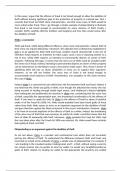In this essay I argue that the offence of fraud is not broad enough to allow the abolition of
theft without leaving significant gaps in the protection of property in criminal law. First, I
concede that fraud and theft share characteristics, and that some cases of theft would be
more suited under fraud. Then, I go through a simple example of pickpocketing to illustrate
that fraud is not broad enough to accommodate for every instance of theft. Finally, I
consider theft’s satellite offences (robbery and burglary) and how they would evolve after
the abolition of theft.
Hinks: a concession
Theft and fraud, whilst being different offences, share some characteristics. Indeed, both of
their mens rea require dishonesty. Moreover, the objective test of dishonesty established in
Ivey is to be applied for both theft and fraud. Another shared characteristic is the one of
intention; fraud requires an intention to make a gain, cause a loss or exposing another to a
risk of loss, whilst theft requires an intention to permanently deprive an owner of their
property. Following this logic, it seems that the mens rea of theft could be included under
the mens rea of fraud. Indeed, intending to permanently deprive an owner of their property
can be synonymous to intending to cause a loss and/or make a gain. Thus, those in favour of
abolishing theft will rely on those similarities in mens rea to support their argument.
However, as we will see further, the actus reus of fraud is not broad enough to
accommodate most instances of theft. Nevertheless, one exception to this claim remains:
the case of Hinks.
Indeed, Hinks is a controversial case which blurs the line between theft and fraud. Indeed, it
was held that Ms. Hinks was guilty of theft, even though she obtained the money she was
being accused of stealing through totally legal means. Lord Hobhouse’s dissent highlights
how inadequate and problematic the decision in Hinks was, considering that the actus reus
of theft, especially the appropriation part, was broadened considerably to fit the offence of
theft. If one were to apply the facts of Hinks to the offence of fraud by abuse of position
under s4 of the Fraud Act 2006, Ms. Hinks would probably have been found guilty of fraud
rather than theft. Hinks seems to serve as an important argument for the abolition of theft
and goes therefore against the thesis enounced in this essay’s introduction. However, Hinks
is far from an accurate depiction of the offence of theft as a whole. Indeed, the broadening
of the actus reus of theft that was necessary to justify Ms. Hinks’ conviction shows that the
facts of Hinks fit awkwardly with theft. Moreover, Hinks predates the Fraud Act 2006. Had
the case taken place after the Fraud Act 2006 was enacted, Ms. Hinks would have certainly
been guilty of fraud, not theft.
Pickpocketing as an argument against the abolition of theft
As set out above, Hinks is a peculiar and controversial case which does not accurately
portray the offence of theft. To understand the difference between theft and fraud, one
must look at a theft at the antipode of Hinks: a simple case of pickpocketing. For example, if
I am standing in the crowded London Underground, and T, a thief, without saying a word to
me, simply reaches into my pocket to steal my wallet, he would very straightforwardly be
guilty of theft. Indeed, by stealing my wallet he did appropriate the property (my wallet)




